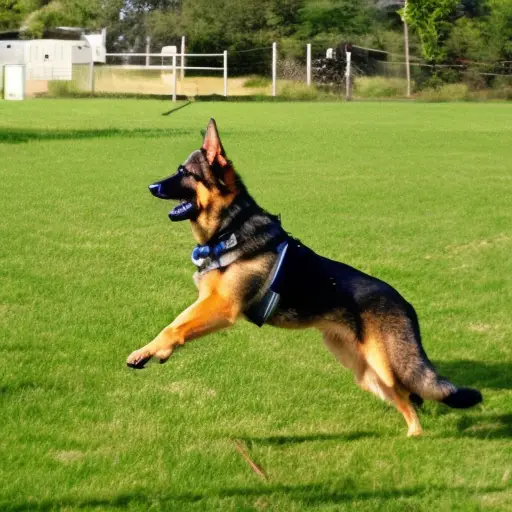Training a German shepherd can be an enriching and enjoyable experience for both you and your dog, so long as you set realistic goals and stick to them. Due to their intelligence, faithfulness, and protective nature, German shepherds are frequently chosen for work in law enforcement, with families, and in the service industry. However, it is essential to begin training at a young age and to maintain coherence in your approach, just as it is with any other breed. The following is a list of some training advice for German shepherds:
- Teaching should begin as soon as possible: It is recommended to begin training your German shepherd as soon as possible, preferably as soon as you bring them home, which is normally around 8 weeks old. They are less rigid in their beliefs and behaviors and have a greater capacity to take in new information at this age.
- Make use of positive reinforcement: Positive reinforcement is a form of training that is widely used because it is effective. When your dog performs an action that you find desirable, you should reward them with a treat, some praise, or one of their favorite toys. This provides positive reinforcement for the desired behavior, which in turn encourages your dog to continue exhibiting that behavior. You should avoid using physical force or punishment with your dog because this might harm the bond that you have with your dog and may even lead to the dog acting aggressively.
- Establish yourself as the pack leader Because German shepherds are by nature dominant breeds, it is essential that you take the initiative to establish yourself as the alpha dog in your pack. This requires you to be consistent with your directions, establish limits, and not give your dog permission to act in a manner that goes against what you would like them to do. This contributes to the development of a harmonious and balanced relationship between you and your dog.
- Your dog has to be exposed to a variety of people, other animals, and situations in order to be socialized. Socialization is the process through which this exposure takes place. They develop greater self-assurance and a more well-rounded perspective as a result of this. It is of utmost significance for German shepherds to learn this, as they have a natural instinct to guard their territory and can become hostile toward strange humans and animals.
- Use obedience training: teaching your dog basic instructions such as “sit,” “stay,” and “come” is an important part of obedience training. These instructions will not only assist you in maintaining your dog’s safety but will also assist you in maintaining control over your dog’s behavior. It is essential that you be consistent with your orders and that you only issue each command one time. If your dog does not obey, you can use a treat to coax them into the correct position or you can direct them there in a gentle manner.
- Train for certain jobs: Depending on what you want to accomplish with your German shepherd, you may wish to train him or her to perform specific jobs, such as protection work, search and rescue work, or service work. This kind of training could be considered more advanced than others and ought to be carried out by an experienced trainer.
- Putting forth the effort to train your dog on a consistent basis should be a part of his daily routine. You should aim to practice for at least twenty to thirty minutes each day, and as your dog gains more expertise, you should gradually increase the time of your sessions as well as the difficulty.
- It is important to have patience when training a German shepherd, as this can take some time. It is essential to maintain order and never to lose your cool or become impatient or angry with your dog. If you are experiencing trouble, you might want to think about getting the assistance of a professional trainer or enrolling in a dog obedience program.
- Utilize a Crate: In order to teach and housebreak your German shepherd, utilizing a crate can be an extremely helpful tool. Your dog will have a place to sleep that is protected from potential dangers, and you won’t have to worry about them getting into mischief while you’re gone. Just make sure to give your dog a good introduction to the crate and never use it as a form of discipline with him.
- In addition to obedience training, it is essential to instruct your German shepherd in proper manners, such as not jumping up on people, not begging at the table, and not stealing food. These are just some of the things that should be covered. These habits can be frustrating or even dangerous, and educating your dog to respect boundaries can help you avoid future difficulties. Teaching your dog to respect boundaries can help you avoid future problems.
- Make use of a leash: A leash is an essential tool for training and commanding your German shepherd, so make sure to make use of it. It is essential that you instruct your dog to walk peacefully while on a leash and not to pull or lunge at other animals or people. To assist in preventing tugging, you might make use of a training leash or a harness.
- It is essential to train your German shepherd to obey directions even when they are not on a leash. Although a leash is necessary for maintaining control of your German shepherd, it is equally essential to train them to do so when they are not restrained by one. When you are in a confined space or in a precarious circumstance, this may come in handy for you.
You will have much more success in training your German shepherd to be a well-mannered and well-trained companion if you follow the advice in this article. Keep in mind that you should constantly employ positive reinforcement with your dog, and that you should also be patient with him. Your German shepherd will eventually mature into a well-mannered and obedient part of your family if you are patient and consistent with his training.

